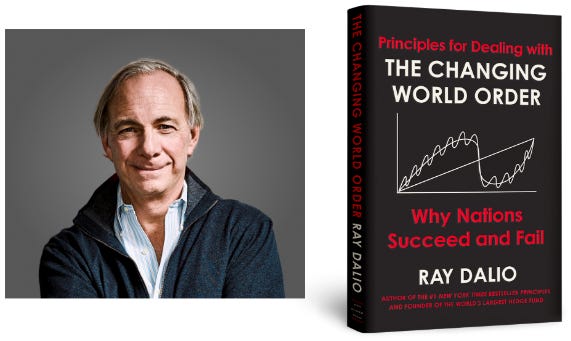Billionaire Ray Dalio on Common Traits of Highly Accomplished People
Welcome to the new members who have joined us since last week. Join other curious minds who receive insights that don’t expire.
Today’s newsletter is brought to you by STAR Resume!
Punch up your resume and highlight WHY you are the right candidate for the job.
The STAR Resume is a free newsletter sharing advice on resume and interview prep.
Ray Dalio is the billionaire Founder, Co-Chief Investment Officer, and Member of the Bridgewater Board (world’s biggest hedge fund).
Someone asked him a straightforward question and I found his answer insightful.
Question: You’ve met a lot of successful people in your life — heads of state, dignitaries, some of the wealthiest people on earth. Would you say there are any common traits among highly accomplished individuals that you’ve met?
Yes.
I’ve actually done personality testing* on acquaintances and friends, including Elon Musk, Bill Gates, and Reed Hastings.
A few things they have in common:
They’re very, very, very curious, and independent thinkers.
They’re “full range” — they’re able to go from the full range of the big picture down to the smallest detail.
They’re both systematic and creative. Most people who are creative may not be so systematic, and most people are systematic may not be creative. They tend to be both.
They tend to hold people accountable. They have high standards for other people. Some people would say they’re rude or abrupt.
Most people at the top of their profession made it there because they must be very smart and very capable. Of course, that enters into it. But it’s really how they deal with what they don’t know.
[*You can learn more about Dalio’s personality tests here.]
When I read the above, I immediately thought of 2 questions people constantly ask me (note: I am ex-Amazon and currently on the founding team of a seed stage startup):
What makes Amazon such a successful company?
Is it true that working at a startup is a learning force multiplier?
Dalio’s answers reminded me of how Amazon institutionalized Leadership Principles (link) through mechanisms to build and maintain the company culture and way of working.
For example:
(1) Dalio mentioned curiosity. Here is Amazon’s Leadership Principle on that.
Learn and Be Curious
Leaders are never done learning and always seek to improve themselves. They are curious about new possibilities and act to explore them.
(2) Dalio mentioned full range. Here is Amazon’s Leadership Principle on that.
Dive Deep
Leaders operate at all levels, stay connected to the details, audit frequently, and are skeptical when metrics and anecdote differ. No task is beneath them.
(3) Dalio mentioned accountability. Here is Amazon’s Leadership Principle on that.
Insist on the Highest Standards
Leaders have relentlessly high standards — many people may think these standards are unreasonably high. Leaders are continually raising the bar and drive their teams to deliver high quality products, services, and processes. Leaders ensure that defects do not get sent down the line and that problems are fixed so they stay fixed.
(4) Dalio at the end said “But it’s really how they deal with what they don’t know.” When evaluating job candidates, one of the core traits discussed is the ability to deal with ambiguity — and this ties back to startups because everyday you deal with ambiguity in terms of getting to product-market-fit, structuring partnership deals, launching a new pricing plan, A/B testing UX designs, etc.
>>Scaling a startup is a learning force multiplier because every day you are altitude switching (macro: drafting 3-year plan/micro: launching Connected Checkout links with brand partners) and context switching (partnerships, product development, voice of the customer, analytics, GTM strategy, hiring, team building, and more).
The follow-up question I have for Dalio is how does one develop the following trait, because instinctually it seems most people index heavily towards one.
They’re both systematic and creative. Most people who are creative may not be so systematic, and most people are systematic may not be creative. They tend to be both.
Thoughts?
P.S. forward this to a friend to inspire them.
Follow me on Twitter and LinkedIn to stay on top of the latest.
“Fly High, Burn Bright, Be Curious.”






